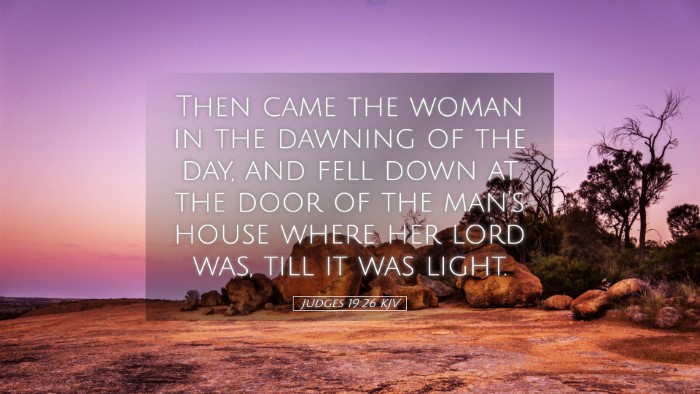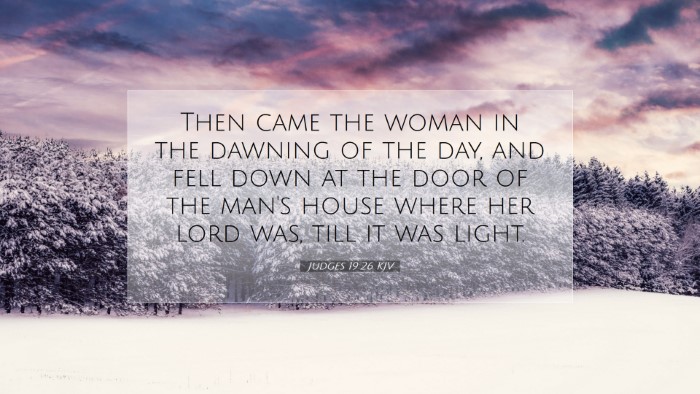Commentary on Judges 19:26
Text of Judges 19:26: “And when the woman arose early in the morning to go away, behold, the man was gone.”
Introduction
The passage in Judges 19 is a harrowing account that reveals the depths of human depravity and the consequences of moral decline in ancient Israel. This particular verse captures a moment of anticipation and dread as the narrative unfolds, ultimately leading to profound social implications.
Contextual Background
Judges 19 is set during a time of tribal confederation and moral chaos. The period is marked by a lack of centralized authority following the death of Joshua. Every individual did “what was right in his own eyes” (Judges 21:25), leading to moral decay and social unrest.
Historical Setting
The events in this chapter provide a lens into the societal conditions of Israel. The Levite, seeking to return home, finds himself in a hostile environment, illustrating the fragmentation of community and the absence of hospitality norms that were valued in ancient Near Eastern culture.
Verse Analysis
In the heart of this narrative, Judges 19:26 serves as a pivotal moment. It transitions the narrative towards the tragic events that the woman will face and reflects broader themes of abandonment, vulnerability, and the dire consequences of societal indifference.
Insights from Matthew Henry
Henry comments on the woman’s early morning actions and the significance of her rise. It symbolizes a glimmer of hope, yet it quickly dissipates as she discovers her companion's absence. Henry emphasizes the spiritual analogy here, suggesting that the forsaking of one who arises to seek acknowledgement parallels the abandonment many experience in their spiritual journeys.
Insights from Albert Barnes
Barnes discusses the implications of the Levite’s neglect towards the woman. His treatment of her reflects the broader uncaring attitudes prevalent in society. Barnes cautions against taking the character of individuals at face value, reminding readers that behind the façade of civilized behavior often lies deep-seated selfishness and cruelty.
Insights from Adam Clarke
Clarke elaborates on the social dynamics of the time, highlighting the vulnerability of women in patriarchal societies. He points out that the woman’s early departure reflects desperation and fear, emphasizing how societal values have become corrupted. Clarke’s analysis compels readers to consider the systemic inequalities present in the narrative.
Thematic Exploration
The narrative encapsulates several key themes relevant for pastoral ministry, scholarship, and theological study:
- Human Depravity: The pervading moral corruption highlights humanity's susceptibility to sin when detached from divine guidance.
- Vulnerability: The woman's predicament exemplifies the plight of the marginalized and the consequences of social neglect.
- Divine Justice: The ensuing tragedy serves as a vehicle for God’s ultimate justice, speaking to the need for accountability in societal norms.
- Community Responsibility: The Levite's failure to care for his concubine raises questions about community accountability and the moral obligation to protect the vulnerable.
Conclusion
Judges 19:26 serves as a sobering reflection on the state of society devoid of ethical responsibility and divine awareness. For pastors, theologians, and students of Scripture, it is a call to engage deeply with the text, drawing lessons on moral accountability, the importance of community support, and the recognition of the vulnerable. The combined insights of revered commentators shed light on the profound implications of this narrative, urging contemporary readers to assess their own community practices against the standards set by scripture.


